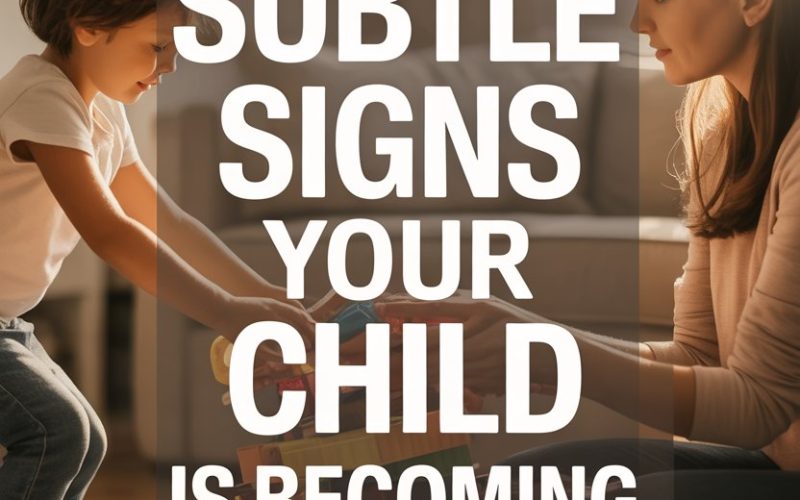Let’s be honest: every parent has wondered at some point if their little angel is turning into a pint-sized dictator.
Modern parenting often feels like a balancing act between wanting to give your children the best and ensuring they don’t think the world revolves around their snack preferences.
Sometimes, the signs of “spoiled” sneak in quietly, like a toddler with a forbidden biscuit behind the couch.
Here’s a look at five sneaky signals your child might be on the fast-track to Spoiledville—and what you can do to gently redirect that train.
1. Tantrums Happen When They Don’t Get Their Way
We all expect the occasional supermarket meltdown (honestly, who hasn’t wanted to join in during the cereal aisle standoff?). Still, there’s a difference between developmental “big feelings” and an ongoing pattern.
If your child’s go-to response to “no” is a full-scale Broadway production—sobbing, flailing, dramatic exits—it could be a sign they haven’t quite learned to cope with disappointment.
The tricky bit here: young children are wired to push boundaries. Yet when they consistently get what they want after a performance, their brains make a connection—“If I shout loud enough, I get the biscuit/chocolate/iPad.”
Dr. Laura Markham, a respected clinical psychologist, notes that consistent boundaries are essential for emotional development. The aim isn’t to squash their emotions, but to help them express needs without expecting the world to bend.
Tonight’s experiment: When your child starts to wind up for a wail because you refuse something, try calmly acknowledging their feelings (“You’re really upset you can’t have another biscuit, aren’t you?”) and stand firm.
Don’t cave, even if your eardrums beg for mercy. Over time, they’ll learn disappointment isn’t the end of the world—and neither is a bland rice cake.
2. Gratitude Is Missing in Action
If “thank you” seems to have vanished from your child’s vocabulary—unless prompted through gritted teeth—it might be time to check in.
Spoiled children often expect things to appear magically, without appreciating the effort behind them.
This isn’t about forcing Pollyanna levels of joy, but nurturing a habit of noticing the good.
According to prominent child development expert Dr. Michele Borba, teaching gratitude actually helps children become more resilient and empathetic humans.
Try a quick “three good things” chat at bedtime. Ask your child what they liked about their day, or who did something kind for them.
If “the neighbour’s dog didn’t bark” is all they can muster, it’s still a start. Keep it light, not preachy.
And when you model gratitude for the small stuff—your morning cuppa, a sunbeam through the window—they’ll catch on.
3. Sharing Feels Like Torture
Territorial behaviour is developmentally normal in toddlers, but if your eight-year-old is still treating playdates like The Hunger Games, it might signal a deeper issue.
Spoiled children often struggle to share toys, snacks, or even a parent’s attention. The core problem? A lack of practice in thinking about others’ needs.
Researchers at the University of Michigan found that kids who regularly practise sharing develop stronger social skills and friendships.
Next time a sibling or friend wants a turn, resist swooping in as the referee. Instead, encourage your child to work it out (“How can you both use the train set?”).
If sharing causes a full-scale mutiny, start small: trading stickers, helping pack a sibling’s school bag, or choosing a treat for someone else. Celebrate even tiny acts of generosity—yes, sharing a single crisp counts.
4. Special Rules Seem to Apply to Them
Ever heard “But I don’t have to!” or “That’s not fair!” delivered at a pitch only dogs can hear?
If your child genuinely believes rules are optional when it comes to their own behaviour—bedtimes, chores, screen limits—it might be time for a reset.
When children regularly dodge consequences or expect exceptions, it means somewhere along the way, the lines got blurry. They start to see themselves as the star of the show (cue jazz hands), with parents and siblings as the supporting cast.
Family therapist Alyson Schafer explains that consistent consequences and clear routines help kids develop respect for others and the confidence to handle life’s inevitable “no’s.”
Tonight, pick one household rule and stick to it like glue. Bedtime is bedtime—even if they’re “about to beat the boss” on their game.
Chores aren’t up for negotiation—everyone contributes, even if it’s just feeding the fish. You’re not being mean; you’re teaching your child that boundaries are part of life, not a personal affront.
5. Empathy Switch Needs Rewiring
All children have moments where their “me” button gets stuck. The difference with a spoiled child? Their empathy wires seem perpetually unplugged.
If you notice your child rarely notices when someone else is sad, tired, or needs help, it’s not too late to tune up those empathy circuits.
Research from Harvard University underscores the value of teaching empathy through modeling and practice—kids learn best when they see caring in action.
Try narrating your own feelings (“I had a tough day at work, could use a cuddle”) or pointing out others’ experiences (“Did you see how happy Grandma was when you called?”).
Small acts, like making a get-well card for a sick friend or helping set the table, encourage perspective-taking. You don’t need to stage a Broadway intervention—just create regular moments where kindness is expected and noticed.
Raising Gracious Kids—Even When You’re Frazzled
No parent sets out to raise a miniature monarch, but even the most well-intentioned efforts can sometimes go sideways. If you spotted your child in any of these signs, there’s no need to panic—or sell all the toys and move to the mountains.
Small, consistent tweaks can make a world of difference.
Show them what respect, gratitude, and empathy look like in everyday life. Stand firm on the boundaries that matter.
Laugh about the slip-ups, and celebrate little victories—because raising thoughtful humans takes time, love, and the occasional chocolate biscuit (for you, not for them).
Remember: spoiling is less about what you give, and more about what you teach.
You’re not alone in this journey, and every calm “no,” every shared treat, every moment of connection counts. Keep going—your future dinner table will thank you.





